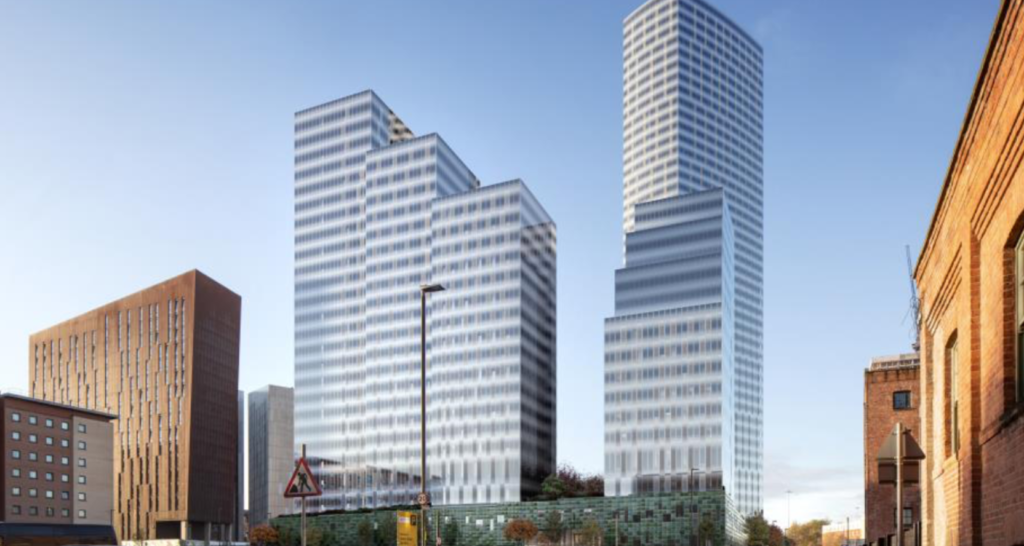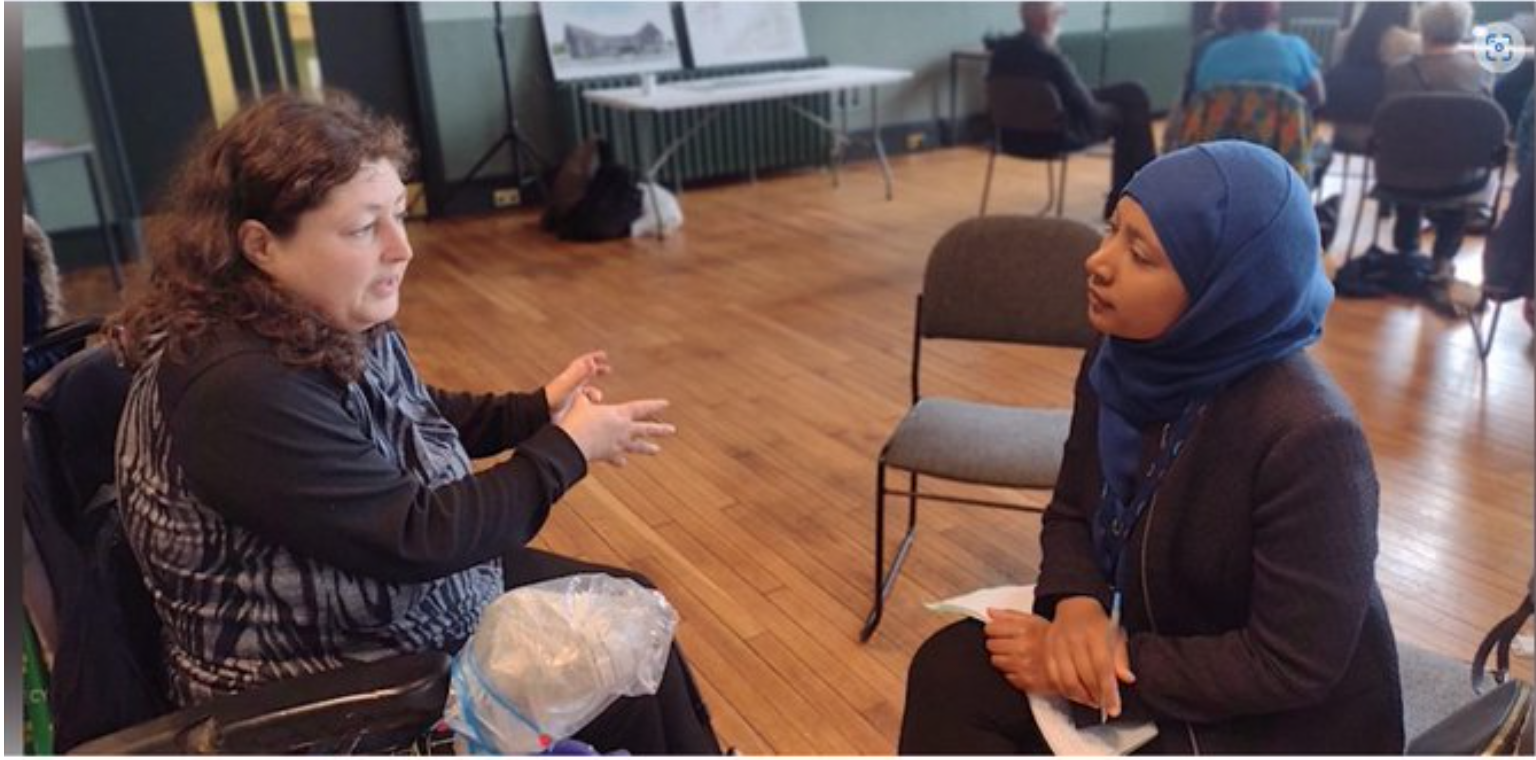By GMHA (@gmhousingaction)
After months of freezing the democratic running of the Planning Committee (supposedly due to Covid-19 but perhaps an opportunistic Executive looking to get previously rejected schemes passed without scrutiny is a better explanation), there is a full meeting on July 30th — this Thursday. Faced with a wave of new proposals, the Manchester City Council (MCC) Planning and Highways Committee needs to show that it has the courage and expertise to stand up to the developer lobby inside and outside the Town Hall, and to put local communities ahead of private profit.
The most worrying of the new applications is Plot 11, First Street from Downing, which sits across from Hulme ward and looks likely to have a significant impact on the community. Perhaps the worst architectural proposal to have made it to the Planning Committee yet, with a range of buildings of between 10 and 45 stories, this application tells a story of pure and simple greed as it seeks to expand the co-living sector.
In our Homes not Assets report 2018/19, GMHA outlined the nature of this new type of development:
Co-living has been promoted by think tanks such as the centre-right Social Market Foundation as offering cheaper accommodation within major cities. It has been classed as affordable housing by Manchester City Council. However, the necessary compromises in living space and the private nature of the scheme means co-living should not be conflated with shared living found in forms of community-led housing (such as cohousing). The focus on middle-earners makes this a questionable definition of affordable housing, and it therefore has not been classed as such for the purposes of this report. Concerns remain about the living conditions of tenants in such schemes and the long-term impact on local communities.
The First Street site already seemed destined to be over-developed, with permission granted in 2016 for 623 apartments. With this revised application, the developer is now asking for permission to build 1,349 units with 609 apartments and 875 studios (2,224 bed spaces total), meaning we could expect up 2,500 new residents. Many of these residents will be forced to live in tiny, cramped 'standard' (20-21sqm) and 'compact' (18-19sqm) spaces which even the developers in the planning application suggested “would not be acceptable as permanent homes and the applicant accepts that the length of tenure would be restricted to six months”.
How has this been allowed through the development process? In a December 2019 report, the council itself argued for caution with regard to co-living:
This product is new and untested in the Manchester housing market.
Testing it out through a 2,000+ bed scheme is not a cautious approach, especially considering there are only 1900 co-living beds across the whole of London. If there were any issues, it would be too late for Manchester to address them. There are already at least two co-living schemes under development that can be used to assess this model. To grant planning permission now for this project would be to completely ignore the principle of test and reflect. The December report reiterated this need for caution:
Given that the product is untested in Manchester, it is not considered appropriate to approve a significant level of co-living accommodation.
The developers have tried to allay fears about this new type of housing by suggesting in the application:
This type of accommodation could meet demand for shorter term lettings from those on short term fixed contracts, employers looking to house employees or contractors for short periods, people who want a space during the working week, or visiting academics and researchers.
So what they are actually proposing is short-term rental apartments, a housing model designed to meet the short-term needs of business with little interest in the long-term improvement of the area. Anti-social behaviour is common with such schemes, alongside significant extra pressure on local services such as GP surgeries.
Perhaps most worrying, it appears that the December 2019 report was ‘updated’ by the MCC Executive in July 2020 to facilitate this development, in what looks like a suspicious change of position since earlier in the year. If anything, the Covid-19 emergency makes this type of development far less desirable, with one London council already raising the alarm. MCC argued in its report:
Co-living should add value to existing wider, economic-led, regeneration frameworks, drive employment, create place and support the talent needed to support growth. Co-living developments would require quality design and space standards, except where there is a compelling justification for an alternative approach.
Clearly none of these conditions hold in relation to the Plot 11 development, and the Planning Committee need to recognise this. Finally, the report makes clear that “the City Council has a land ownership interest in the site”; hence the committee must be informed about the financial benefits to the local authority that would accrue from this development. This is particularly important as the developer may be using the co-living model to avoid making a financial contribution to the city it stands to profit significantly from. Downing argues in the application that:
Due to the type of accommodation and use class, the development would not appear to be considered in the local planning framework for a contribution to affordable housing or provision of other s106 contribution.
In short, 1,349 units, for which the developer can charge higher rents for smaller spaces, with not a penny going towards affordable housing or neighbourhood improvements. It is an attempt to extract as much profit as possible from the site via a housing model that is neither tested nor required.
The application ignores the problems that co-living may cause for the city and leaves it with a potentially problematic building development that may turn into a slum of the future. The only course of action for the Planning Committee is to reject this application and force the developers back to the drawing board. The consequences of signing off Plot 11 as an over-developed co-living scheme would be felt for many years to come, especially by the adjacent Hulme community. Let’s hope the Planning Committee are prepared to act, now that they have finally been allowed to resume their powers.
25 July 2020





